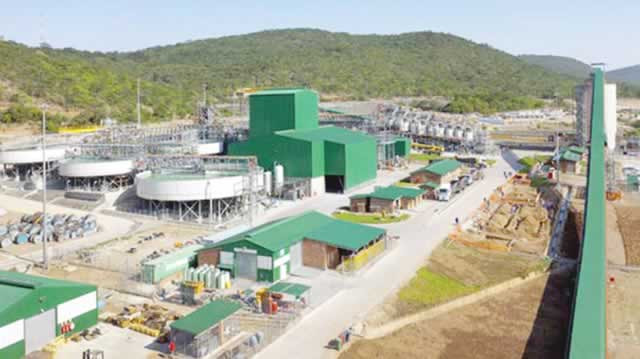
SHURUGWI-based platinum group metals (PGM) producer, Unki Mine, increased its output by 17% to 61 800 ounces in the fourth quarter ended December 31, 2023, driven by higher throughput.
Unki is a unit of Johannesburg Stock Exchange listed Anglo American Platinum (AngloPlat), one of the world’s biggest PGM producers.
The firm operates several PGM mines in South Africa, which holds the world’s second largest proven reserves.
The firm entered the Zimbabwean market about a decade ago after major discoveries at Unki near Shurugwi.
Angloplat supplies nearly 40% of global platinum needs and has been undertaking significant expansion projects to bolster output at its Zimbabwe operation.
“PGM production from Unki increased by 17% to 61 800 ounces, driven by 13% higher throughput, supported by a 5% increase in the 4E (platinum, palladium, rhodium and gold) built-up head grade to 3,39 gramme per tonne,” AngloPlat said in production report for the fourth quarter ended December 31, 2023.
The group’s chief executive officer Craig Miller said despite the challenging macro environment and the operational headwinds experienced throughout the year, they maintained a safe and stable operating performance, with a strong focus on operational resilience and zero harm.
“Total PGM production was 6% lower, as continued poor ground conditions and infrastructure closures at Amandelbult contributed to lower production,” Miller said.
- Top miner Maposa mourned
- Top miner Maposa mourned
- Stockbroker targets mbira fame
- ‘Nedbank financial instrument listing on VFEX a game-changer’
Keep Reading
“We also completed the disposal of our 50% interest in Kroondal effective 1 November 2023, resulting in Kroondal production reported as third party POC going forward.
“Looking ahead and in response to the prevailing weakness of the PGM basket price and persistent cost inflation, we reset our operational plans in December 2023 and are deploying a series of measures to improve our competitive position while preserving our long-term optionality.
“We are committed to safely delivering production with lower cost and capital requirements whilst deploying value over volume capital allocation discipline.
“These measures will allow us to capitalise on our industry leading portfolio for the long-term benefit of our stakeholders.”
The group’s total PGMs production decreased by 6% to 932 200 ounces in the period under review. Total annual PGM production was 3,8 million ounces.
Own-managed mines PGMs production decreased by 3% to 543 500 ounces, mainly due to lower production at Amandelbult as a result of planned infrastructure closures and poor ground conditions at Dishaba Mine.
The group said decrease at Amandelbult was partially offset by higher production from Unki and Mogalakwena.
Joint operations PGM production (mined and purchase of concentrate) decreased by 47% to 104 400 ounces.
Purchase of PGM concentrate from third parties increased by 21% to 284 300 ounces, due to the inclusion of Kroondal production as 100% third party POC from November 1, 2023.
Refined PGMs production (owned production, excluding tolling) increased by 36% to 1,2 million ounces, with refined production in the prior period impacted by the delay in recommissioning the Polokwane smelter.
Total annual refined PGM production was 3,8 million ounces. PGMs sales volumes (from production, excluding sales from trading) increased by 32% to 1,2 million ounces in line with higher refined production.
While Zimbabwe’s platinum mines, including Unki, are still relatively smaller compared to South African peers, the country still has a huge say in production trends worldwide.
The southern African country holds the world’s third largest proven platinum reserves after South Africa and Russia.







